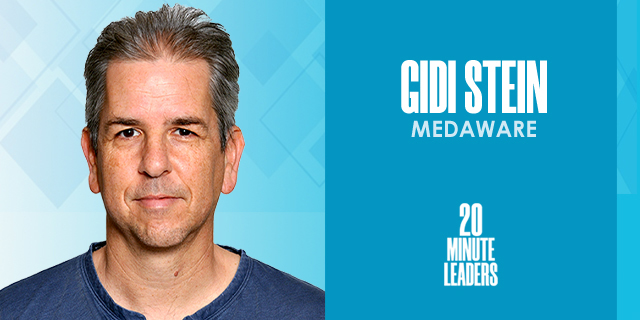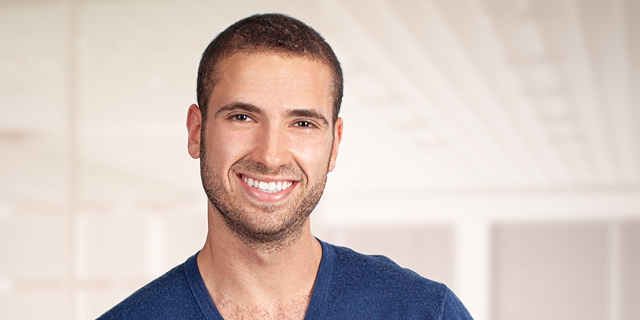
20-Minute Leaders
“It's impossible to think that clinicians can write prescriptions without a safety net, without some kind of safety check"
Doctors make simple mistakes, and Dr. Gidi Stein shares with Michael Matias his mission to help prevent these mistakes from affecting patients
Click Here For More 20MinuteLeaders
Tell me about yourself and the problem you've gotten exposed to over the last few years.
I started off as a software engineer. I was co-founder of several failing startups in the early ’90s. I vowed never to do it again. I was one of the oldest medical students in Tel Aviv University. Then I specialized in internal medicine and had executive roles in a hospital. I did a PhD and was an associate professor. I practiced. Life was good. I was definitely not going back to the startup world.
But that changed a few years ago when in Israel, a nine-year-old boy died simply because his physician clicked on the wrong entry in the pull down menu of drugs. He wanted to prescribe the boy Singulair, which is a drug for asthma, but clicked on the next entry, Sintrom, a very potent anticoagulant. The boy fell off his bike a week later and died of intracranial hemorrhage.
When I heard about this, I thought, "It could happen to me as a prescriber or to one of my kids. We should do something about it." It wasn't bad judgment from the physician. It was a typo. It was strong enough to take me away from my path to leading a department and take another path to solve this problem.
What did you ask yourself as an entrepreneur when you read that news?
The minute I heard about the problem, I knew already how I'm going to solve it. Entrepreneurs are usually overly optimistic. There's a Hebrew phrase, "We are morons but optimistic." I already saw it working. I was positive that we could solve it and everything will be wonderful.
As you were thinking about going back into the startup scene, what was your thinking?
I actually conducted several data analyses on historical records from several healthcare institutions in Israel. We found thousands of potential errors. We went back and sat with the head of departments, and we found two interesting things. First, we were very accurate. Most of the stuff that we found actually represented errors. The most striking thing was in the vast majority of the cases, the physicians were unaware that an error had happened. This was the aha moment.
Where is MedAware today? What is the solution that you bring?
The essence behind the solution is let's make our clinical data accessible and smarter in the workforce. We're taking all the data that was already typed into the database, and by applying the right machinery and algorithms, we're able to identify individual risks that physicians were not aware of.
We have very low alerts per day, but 80% of what we generate has true clinical relevance. Most of it actually causes change in physician practices. This is like the holy grail. To actually make an intervention that would make the physician stop and think, "Hey, is this a typo?”
One of the things that we emphasize is that we're not passing judgment. We're not telling physicians how to work or practice or what is the right medicine. We're just saying, "You may have a typo." Or, "You may miss something.” It's not a clinical judgment. It's human error. We are a smart spellchecker.
By applying these methodologies, we're able to really address a wide range of potential risks. We're able to monitor the patients even if the prescription came weeks before and identify new situations that are evolving that might put the patient at risk.
It's not just as simple as looking at typos. The medicine may not be relevant because something has changed that the physician may not be aware of. Right?
For example, if a cardiologist prescribed aspirin for a patient that had myocardial infarction. Every month, he renews his medication. But three months ago, he was diagnosed with cancer. Based on his chemotherapy, his platelet levels drop. It puts the patient at risk of bleeding. The aspirin puts him at greater risk. The combination of the patient profile with aspirin is hazardous, and you need to raise a red flag. Our system is able to identify these and make sure they're not harmed unintentionally just because they are treated in two different places.
How do you go about implementing this with physicians, hospitals, and patients?
We are an Israeli company. We have quite a few live deployments here, which are very successful. When we started to enter the US market, we hit the brick wall. Then a medical device company approached us and said, "Hey, we have the same problem with alert fatigue with our devices. Why don't we use your technology to take the data from the medical device and medical records and make these devices smarter?"
We signed a very large strategic partnership. It's going very nicely. But then it brought us to this thought, maybe this is the right model for us. Instead of knocking on doors of hundreds of hospitals, let's find the right strategic partners. The impact that we're able to bring to the world is much greater because we are able to scale this much better than selling to each hospital.
What is different in your journey now compared to your earlier startup experience?
As compared to my startups in the early ’90s, which were very nice technological startups but didn't have a soul, I'm doing this for me. I'm doing this for my kids. I couldn’t live with myself when this happens to me as a prescriber. Definitely I couldn’t live with myself when this happens to one of my loved ones. I want to make sure I do everything that I can to make sure that this never happens again.
Where do you see MedAware in a few years?
In the late ’80s, I had the first word processors. Then there was this revolutionary idea of a spellchecker. Why do I need this thing? I know how to spell. Now, I can't even think of life without a spellchecker. I think the same thing about MedAware. It's impossible to think that clinicians can write prescriptions without a safety net, without some kind of safety check. It's unthinkable.
Going forward, it's not only going to be the safety net. If we can use the data that is already in our systems to ease the journey and make the decisions easier, bringing up to the clinicians the right information at the right time to help him make the better choice, then this will be my two cents. At the end of the day, the clinical value is in the physician office, in this intimate moment when the physician and his patient are sitting together. All the technology is just an aid to make sure that what comes out of this moment is really helpful and definitely not damaging. I think we can help with that.
What really fascinated you as a kid?
Jules Verne, sci-fi.
What inspires you today?
My kids and my patients. For my patients, I learned that basically I don't know anything. And my kids tell me that I don't know anything. It's a humbling experience.
What are three words you would use to describe yourself?
Lazy, stubborn, and optimistic. Throughout my career, laziness is a virtue. I don't like wasting time on something, so I create software that will do it for me. Stubborn, that's part of the prerequisites of being in startups. If you're not optimistic, then you have no way of going again and again against the same brick wall and be sure and positive that you're going to crash it this time and crash again.
Michael Matias, Forbes 30 Under 30, is the author of Age is Only an Int: Lessons I Learned as a Young Entrepreneur. He studies Artificial Intelligence at Stanford University, while working as a software engineer at Hippo Insurance and as a Senior Associate at J-Ventures. Matias previously served as an officer in the 8200 unit. 20MinuteLeaders is a tech entrepreneurship interview series featuring one-on-one interviews with fascinating founders, innovators and thought leaders sharing their journeys and experiences.
Contributing editors: Michael Matias, Megan Ryan
